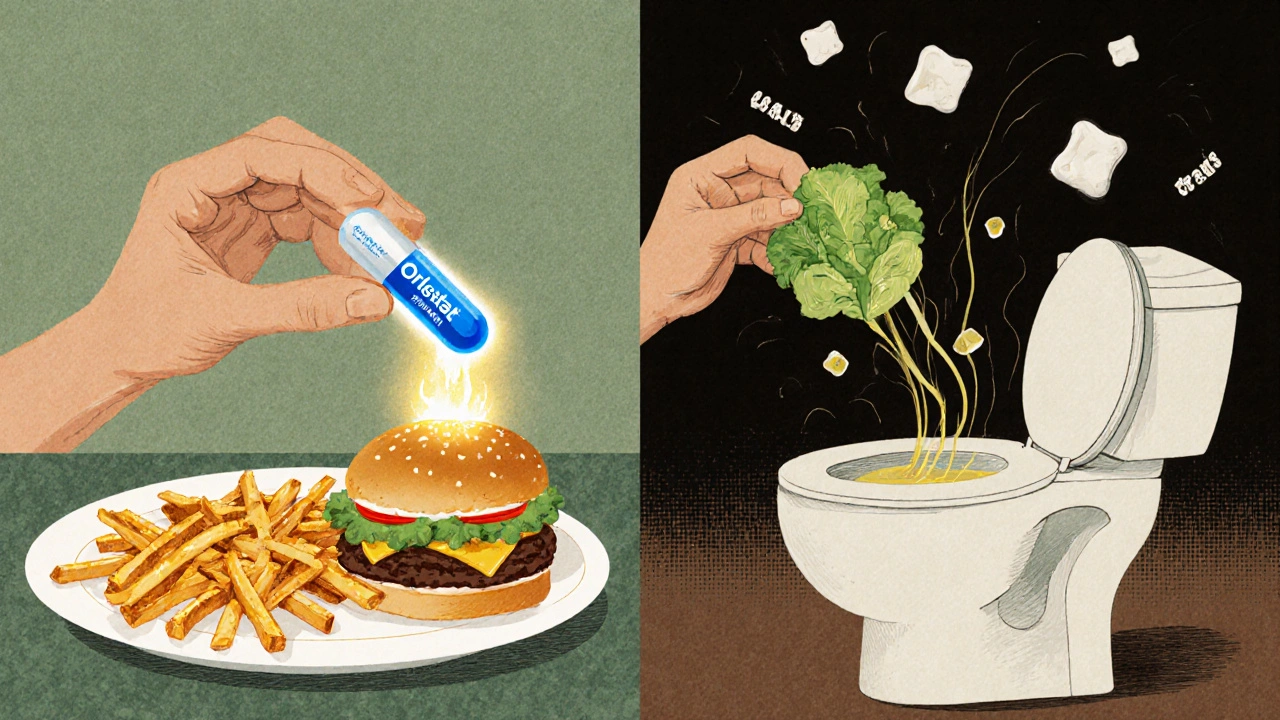Orlistat isn’t the only weight loss pill on the shelf, but it’s one of the few that’s been around long enough to prove it actually works. If you’ve ever stood in front of the pharmacy aisle wondering whether Orlistat is worth it-or if there’s something better-you’re not alone. Millions of people try weight loss medications every year, and Orlistat sits right in the middle of the conversation. But what does it really do? And are there safer, easier, or more effective options out there?
What Orlistat Actually Does
Orlistat is a fat blocker. It doesn’t burn fat, suppress appetite, or speed up your metabolism. Instead, it stops your body from absorbing about 30% of the fat you eat. That undigested fat passes through your system and leaves your body in your stool. It’s not magic. It’s chemistry. The drug works by blocking lipase, an enzyme your pancreas makes to break down fat in your gut. Without that enzyme, fat molecules stay too big to be absorbed.
That’s why people on Orlistat often notice oily stools, frequent bowel movements, or even leakage. It’s not a side effect-it’s the point. If you eat a burger with a big slice of cheese and a side of fries, Orlistat makes sure a chunk of that fat doesn’t turn into stored body fat. But if you eat a salad, Orlistat does almost nothing. That’s why it only works if you’re eating fat. No fat, no effect.
Studies show people using Orlistat lose about 5-10% of their body weight over a year-on average, 1-2 pounds per week-when combined with a reduced-calorie diet. That’s not dramatic, but it’s real. And it’s one of the only weight loss medications approved by the FDA for long-term use.
Orlistat’s Two Faces: Xenical and Alli
There are two versions of Orlistat: Xenical and Alli. They’re the same drug, just different doses. Xenical is the prescription version: 120 mg per capsule. Alli is the over-the-counter version: 60 mg per capsule. Both work the same way, but Xenical is stronger. If you’re significantly overweight (BMI over 30) and your doctor recommends it, Xenical is usually the choice. Alli is meant for people who are overweight but not obese (BMI 25-30) and want to manage weight without a prescription.
Both require you to take one capsule with each main meal that contains fat-up to three times a day. Skip the fat, skip the pill. If you eat a meal with no fat, you don’t need to take it. That’s a big advantage over other pills that force you to take them regardless of what you eat.
But here’s the catch: Orlistat doesn’t work unless you stick to a low-fat diet. If you eat a high-fat meal while taking it, you’re asking for unpleasant results. That’s why many people stop using it after a few weeks. It’s not the weight loss that turns people off-it’s the side effects.
Alternative #1: Semaglutide (Wegovy, Ozempic)
If Orlistat is a fat blocker, semaglutide is a hunger suppressor. It’s a GLP-1 receptor agonist, originally developed for type 2 diabetes, but now widely used for weight loss under brand names like Wegovy and Ozempic. Unlike Orlistat, it works on your brain, not your gut.
Semaglutide slows digestion and tells your brain you’re full-so you eat less. People using Wegovy lose an average of 15% of their body weight over 68 weeks. That’s double what Orlistat achieves. And the weight loss is more consistent. No oily stools. No sudden bathroom trips.
But there’s a price. Wegovy costs around £120-£150 per week in the UK. It’s not covered by the NHS for weight loss unless you have type 2 diabetes or other obesity-related conditions. You need a prescription. And it’s given as a weekly injection. Some people experience nausea, vomiting, or constipation, especially at first.
If you’re looking for fast, significant results and can afford it, semaglutide is far more effective than Orlistat. But if you want a pill you can take without injections, without a doctor’s note, and for less than £10 a week, Orlistat still has its place.
Alternative #2: Phentermine
Phentermine is an appetite suppressant that’s been around since the 1950s. It works like a stimulant, boosting norepinephrine and dopamine to reduce hunger. It’s usually prescribed for short-term use-12 weeks or less-because it can raise blood pressure and heart rate.
Compared to Orlistat, phentermine helps people lose weight faster in the first few months. But the effects fade quickly. Most regain the weight after stopping. It’s also not safe for people with heart conditions, high blood pressure, or anxiety.
Orlistat, by contrast, doesn’t affect your heart rate or blood pressure. It’s safer for long-term use. But phentermine doesn’t cause digestive side effects. If you can tolerate the stimulant effects and only need a short-term jumpstart, it’s a powerful tool. But it’s not a long-term solution.

Alternative #3: Liraglutide (Saxenda)
Liraglutide is another GLP-1 agonist, similar to semaglutide but slightly less potent. It’s sold as Saxenda for weight loss and requires daily injections. People lose about 8-10% of their body weight over a year-better than Orlistat, but not as much as Wegovy.
Like semaglutide, it reduces appetite and slows stomach emptying. Side effects include nausea, dizziness, and fatigue. It’s expensive-around £100-£120 per month-and not widely available on the NHS for weight loss alone.
One advantage: liraglutide has been studied for over a decade. It’s been used by millions. But if you hate needles, it’s not for you. Orlistat wins on convenience.
Alternative #4: Natural Supplements (Garcinia Cambogia, Green Tea Extract, etc.)
You’ll see dozens of supplements promising weight loss without pills or prescriptions. Garcinia cambogia, green tea extract, caffeine, and conjugated linoleic acid (CLA) are common. But here’s the truth: none of them have strong, reliable evidence backing their claims.
A 2023 review of 17 studies on Garcinia cambogia found no significant weight loss compared to placebo. Green tea extract might help burn a few extra calories, but only if you’re already exercising and eating well. CLA has mixed results and can cause digestive upset.
These supplements are cheap and easy to get. But they don’t come close to Orlistat’s proven results. If you’re looking for something natural, focus on diet and movement first. Supplements won’t replace that.
Alternative #5: Lifestyle Changes Alone
Let’s be honest: the most effective weight loss strategy isn’t a pill. It’s changing how you eat and how you move. Studies show that people who combine a healthy diet with regular exercise lose more weight than those using any medication alone.
Orlistat helps you stick to a low-fat diet. But if you don’t change your eating habits, the weight will come back. The same goes for semaglutide or phentermine. When you stop the pill, hunger returns. Fat absorption resumes.
The real winner? A diet rich in vegetables, lean protein, and whole grains. Walking 10,000 steps a day. Sleeping 7-8 hours. Managing stress. These aren’t glamorous. But they work. And they don’t cost a penny.

Which One Should You Choose?
Here’s a simple guide:
- Choose Orlistat if you want an affordable, non-prescription option that works with your diet-and you’re okay with digestive side effects.
- Choose semaglutide (Wegovy) if you want the strongest results, can afford it, and don’t mind injections.
- Choose phentermine if you need a quick kickstart and have no heart issues.
- Choose liraglutide (Saxenda) if you prefer daily injections over weekly ones and want proven results.
- Choose lifestyle changes if you want results that last beyond the pill.
Orlistat isn’t the best. But it’s the most accessible. It’s the only weight loss pill you can buy off the shelf without a prescription. It’s safe for long-term use. And it’s backed by decades of research. If you’re starting out, it’s a solid first step.
What Happens When You Stop?
One thing all weight loss medications have in common: the weight comes back if you stop. That’s true for Orlistat, semaglutide, and phentermine alike. The body doesn’t magically reset. It remembers the weight it had before.
That’s why the goal shouldn’t be to lose weight fast. It should be to learn how to live differently. Orlistat can help you cut fat intake. But the real win is when you start enjoying meals without needing to count every gram of fat. When you don’t crave fried food. When you move because it feels good-not because you’re trying to burn off last night’s dinner.
Final Thoughts
There’s no single best weight loss pill. What works depends on your body, your budget, your lifestyle, and your goals. Orlistat isn’t flashy. It doesn’t promise miracles. But it’s honest. It works slowly, consistently, and safely-if you’re willing to change how you eat.
If you’re considering any weight loss medication, talk to your GP first. Some options interact with other drugs. Some aren’t safe if you have certain health conditions. And remember: no pill replaces a healthy diet and regular activity. Medications are tools-not shortcuts.
Is Orlistat safe for long-term use?
Yes, Orlistat is approved for long-term use by health authorities like the FDA and EMA. It doesn’t affect the liver, heart, or brain. The main risks are digestive side effects-oily stools, gas, and frequent bowel movements-which usually improve after a few weeks. Long-term use can lead to lower absorption of fat-soluble vitamins (A, D, E, K), so taking a multivitamin once a day, at least 2 hours before or after Orlistat, is recommended.
Can I take Orlistat without dieting?
No. Orlistat only works when you eat fat. If you eat a low-fat or no-fat meal, the pill does nothing. Taking it without reducing fat intake won’t help you lose weight and will likely cause uncomfortable side effects. For best results, aim for a diet where fat makes up no more than 30% of your total calories.
How quickly does Orlistat start working?
Orlistat starts working within hours of your first dose. You’ll notice changes in your bowel movements-like oiliness or increased frequency-within the first few days. Weight loss typically begins after 1-2 weeks, but the real results show up after 4-6 weeks of consistent use with a healthy diet.
Does Orlistat burn belly fat?
No. Orlistat doesn’t target belly fat specifically. It blocks fat absorption from any meal you eat, whether it’s from your stomach, thighs, or arms. Fat loss happens evenly across the body. To reduce belly fat, you need to lose overall body weight through a calorie deficit. Orlistat helps create that deficit by reducing fat intake.
Can I drink alcohol while taking Orlistat?
Yes, you can drink alcohol while taking Orlistat. Alcohol doesn’t interfere with how Orlistat works. But most alcoholic drinks are high in calories and often mixed with sugary or fatty ingredients (like cream or syrup). If you’re drinking regularly, it can slow your weight loss. Stick to low-calorie options like wine or spirits with soda water.


Mike Gordon
Orlistat is the OG of fat blockers and honestly? It’s the only one that doesn’t make you feel like you’re on a drug. I tried Wegovy for a month - $150 a week and I was nauseous all the time. Orlistat? I just got weirdly gassy and learned to stop eating fries. Worth it.